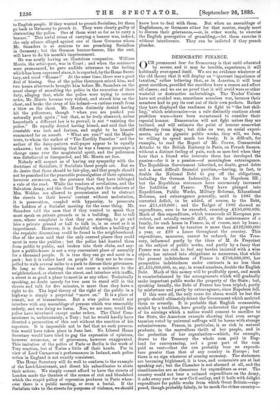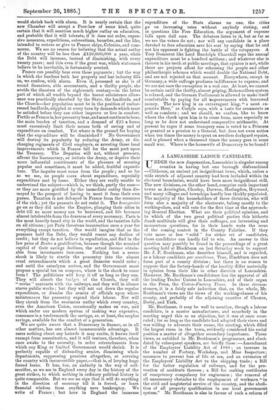was disbelieved or disregarded, and Mr. Morris set free. hear
that a friend who interests them has developed the Nobody will suspect us of having any sympathy with the passion—for it is a passion—of meaningless extravagance. doctrines of Socialists, if Socialists these people are. But we The Republican Government inherited, no doubt, great debts do desire that there should be fair-play, and that people should and a most difficult financial position,—having, in fact, to not be punished for the peaceable promulgation of their opinions, double the National Debt to pay off the obligations, however erroneous, on the pretence that they have infringed including the German Indemnity, due to Napoleon III. ; a rule of the road. While the vendors of revelations, and the but the Republican statesmen have enormously increased would shrink back with alarm. It is nearly certain that the new Chamber will accept a Poor-law of some kind, quite certain that it will sanction much higher outlay on education, and probable that it will tolerate, if it does not order, expen- sive measures, expeditions, subventions, bounties, and the like, intended to restore or give to France ships, Colonies, and com- merce. We see no reason for believing that the actual outlay of the country will be less than £150,000,000 a year, while the Debt will increase, instead of diminishing, with every twenty years ; and this even if the great war, which statesmen believe to be inevitable, is fortunately averted. France can possibly bear even these payments ; but the way in which she burdens both her property and her industry fills us, we confess, with alarm. Even if, possessed as she is of sound financiers, able accountants, and a thrifty people, she avoids the disasters of the eighteenth century—in the latter part of which all wealth beyond the barest subsistence allow- ance was practically absorbed by the State, the landlords, and the Church—her population must be in the position of embar- rassed landlords, crippled at every turn by demands which must be satisfied before they can either improve or live in comfort. Fertile as France is, her peasantry bear, and must continue to bear, the main burden of taxation, and a demand of £25 a house must excessively limit their means both of saving and of expenditure on comfort. Yet where is the ground for hoping that the expenditure will be diminished ? No Government will destroy its popularity by reducing the Army, or dis- charging regiments of Civil employes, or arresting those local improvements which in France fall for the most part upon the Treasury. The Deputies will not, without pressure, affront the bureaucracy, or irritate the Army, or deprive their more influential constituents of the pleasure of securing popular and sometimes, it must be added, fruitful expendi- ture. The impulse must come from the people ; and so far as we see, no people cares about expenditure, especially expenditure met by loans. Either they are really unable to
understand the subject—which is, we think, partly the case—
or they are more gratified by the immediate outlay than dis- mayed by the prospect of having to meet it from their own purses. Taxation is not defrayed in France from the resources of the rich ; yet the peasants do not resist it. The bourgeoisie go on as they did under the Empire, plunging their cities in debt till no more money can be borrowed, and life becomes almost intolerable from the dearness of every necessary. Paris is the most heavily taxed city in the world, and the taxation falls on all citizens ; yet Paris threatens insurrection once a year for everything except taxation. One would imagine that as the peasants hold the Debt, they would resent any decline of credit ; but they do not believe in repudiation, and find in the low price of Rentes a gratification, because though the nominal capital of their savings declines, the actual income obtain- able from investments increases. Nothing but a severe shock is likely to startle the peasantry into the almost cruel retrenchments which a great financier would order ; and until the cataclysm arrives, and the Government must propose a special tax on coupons, where is the shock to come from ? The politicians will keep it off as long as they can.
They will absorb the budget of the Church, they will " revise " contracts with the railways, and they will in silence starve public works ; but they will not cut down the regular expenditure, or dismiss the armies of officials upon whose maintenance the peasantry expend their labour. Nor will they shrink from the enormous outlay which every country, even the American Union, occasionally makes on war, and which under our modern system of making war expensive, consumes in a twelvemonth the savings, or, at least, the surplus savings, available for the comfort of a generation.
We are quite aware that a Democracy in finance, as in all other matters, has one almost immeasurable advantage. It cares nothing about any hatreds it may excite, it knows itself exempt from assassination, and it will venture, therefore, when once awake to the necessity, to order retrenchments from which any King or limited Government would shrink. It is perfectly capable of disbanding armies, dismissing whole departments, suppressing pensions altogether, or covering the country with inconvertible paper,—that is, of levying huge forced loans. It has, too, an audacity in the way of self- sacrifice, as we see in England every day in the history of the great strikes, to which nothing in ordinary political history is quite comparable. But we see no sign that it will do anything in the direction of economy till it is forced, or learn financial wisdom from anything save bankruptcy. We write of France ; but here in England the immense expenditure of the State alarms no one, the cities go on increasing rates without anybody rioting, and in questions like Free Education, the argument of expense falls upon dull ears. The debaters listen to it, but as far as we see the voters do not ; nor will any candidate in a place devoted to free education save his seat by saying that he and not his opponent is fighting the battle of the ratepayers. A Tory Democrat like Lord Randolph Churchill says the annual expenditure must be a hundred millions ; and whatever else is thrown in his teeth at public meetings, that opinion is not, while there are projects afloat for rehousing the people and other philanthropic schemes which would double the National Debt, and are not rejected on that account. Everywhere, except in Germany, a wide suffrage produces indifference to expense, and we are not sure the exemption is a real one. At least, we cannot be certain until the thrifty, almost griping, Hohenzollern system is relaxed, and the German Parliament is allowed to make itself comfortable by paying for all improvements with borrowed money. The new king is an extravagant king, " a most ex- pensive Herr," as Carlyle says, with a taste for ornaments as well as comforts ; and we should, we confess, like to know where the check upon him is to come from, more especially so long as he does not understand comparative arithmetic. At present he rages if some trumpery sum is voted to a Princess or granted as a pension to a General, but does not even notice when ten times the money is spent on needless dockyard repairs, and is pleased when a thousand times the money goes in some small war. Where is the housewife of Democracy to be found?



































 Previous page
Previous page